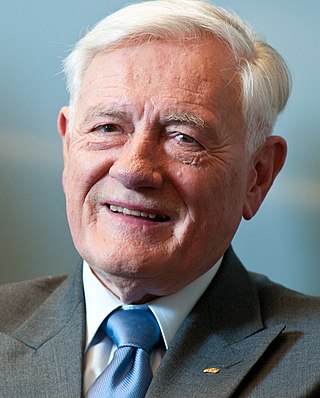
Valdas Adamkus is a Lithuanian politician, diplomat and civil engineer who served as the fifth and seventh president of Lithuania from 1998 to 2003 and again from 2004 to 2009.
Europe, the westernmost portion of Eurasia, is often divided into regions and subregions based on geographical, cultural or historical factors. Since there is no universal agreement on Europe's regional composition, the placement of individual countries may vary based on criteria being used. For instance, the Balkans is a distinct geographical region within Europe, but individual countries may alternatively be grouped into South-eastern Europe or Southern Europe.
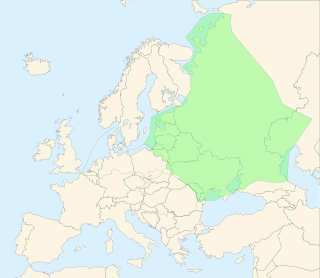
The East European Plain is a vast interior plain extending east of the North European Plain, and comprising several plateaus stretching roughly from 25 degrees longitude eastward. It includes Volhynian-Podolian Upland on its westernmost fringe, the Central Russian Upland, and, on the eastern border, encompasses the Volga Upland. The plain includes also a series of major river basins such as the Dnepr Basin, the Oka–Don Lowland, and the Volga Basin. At the southeastern point of the East European Plain are the Caucasus and Crimean mountain ranges. Together with the North European Plain, and covering the Baltic states, European Russia, Belarus, Ukraine, Moldova, southeastern Romania, and, at its southernmost point, the Danubian Plain in Northern Bulgaria, it constitutes the majority of the Great European Plain, the greatest mountain-free part of the European landscape. The plain spans approximately 4,000,000 km2 (2,000,000 sq mi) and averages about 170 m (560 ft) in elevation. The highest point of the plain, located in the Valdai Hills, is 346.9 metres (1,138.1 ft).
Territorial changes of the Baltic states refers to the redrawing of borders of Lithuania, Latvia and Estonia after 1940. The three republics, formerly autonomous regions within the former Russian Empire and before that of former Polish–Lithuanian Commonwealth and as provinces of the Swedish Empire, gained independence in the aftermath of World War I and the Russian Revolution of 1917. After a two-front independence war fought against both Bolshevist Russian and Baltic German nationalist forces, the countries concluded peace and border treaties with Soviet Russia in 1920. However, with World War II and the occupation and annexation of these republics into the Soviet Union twenty years after their independence, certain territorial changes were made in favour of the Russian SFSR. This has been the source of political tensions after they regained their independence with the dissolution of the Soviet Union. Some of the disputes remain unresolved.
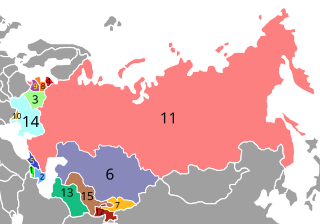
The post-Soviet states, also referred to as the former Soviet Union (FSU) or the former Soviet republics, are the independent sovereign states that emerged/re-emerged from the dissolution of the Soviet Union in 1991. Prior to their independence, they existed as Union Republics, which were the top-level constituents of the Soviet Union. There are 15 post-Soviet states in total: Armenia, Azerbaijan, Belarus, Estonia, Georgia, Kazakhstan, Kyrgyzstan, Latvia, Lithuania, Moldova, Russia, Tajikistan, Turkmenistan, Ukraine, and Uzbekistan. Each of these countries succeeded their respective Union Republics: the Armenian SSR, the Azerbaijan SSR, the Byelorussian SSR, the Estonian SSR, the Georgian SSR, the Kazakh SSR, the Kirghiz SSR, the Latvian SSR, the Lithuanian SSR, the Moldavian SSR, the Russian SFSR, the Tajik SSR, the Turkmen SSR, the Ukrainian SSR, and the Uzbek SSR. In Russia, the term "near abroad" is sometimes used to refer to the post-Soviet states other than Russia.

Russia–European Union relations are the international relations between the European Union (EU) and Russia. Russia borders five EU member states: Estonia, Finland, Latvia, Lithuania and Poland; the Russian exclave of Kaliningrad is surrounded by EU members. Until the radical breakdown of relations following the 2022 Russian invasion of Ukraine, the EU was Russia's largest trading partner and Russia had a significant role in the European energy sector. Due to that full-scale invasion, relations became very tense after the European Union imposed sanctions against Russia. Russia placed all member states of the European Union on a list of "unfriendly countries", along with NATO members, Switzerland, Ukraine, and several Asia-Pacific countries.

The Community of Democratic Choice is an intergovernmental organization established on 2 December 2005, by nine states of Northern, Central and Eastern Europe in Kyiv, Ukraine. It was mainly signed by countries from the region between the Baltic, Black Sea and Caspian Sea. Its main task is to promote democracy, human rights, and the rule of law throughout the region.
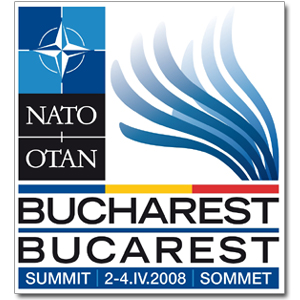
The 2008 Bucharest Summit or the 20th NATO Summit was a NATO summit organized in the Palace of the Parliament, Bucharest, Romania on 2 – 4 April 2008.
The Community of Democratic Choice Youth Forum is an international organization registered in Riga, Latvia. It aims to promote partnership and dialogue among youth from the region of the Community of Democratic Choice.

Visaginas Nuclear Power Plant was a planned nuclear power plant project in Lithuania. It was proposed to be built at the site of the closed Ignalina Nuclear Power Plant, which was shut down on 31 December 2009 in accordance with Lithuania's accession agreement to the European Union. The two reactors of the Ignalina plant are currently undergoing a decommissioning process.
East-Central Europe is the region between German-, Hungarian-, and West Slavic-speaking Europe and the East Slavic countries of Belarus, Russia, and Ukraine. Those lands are described as situated "between two": "between two worlds, between two stages, between two futures".
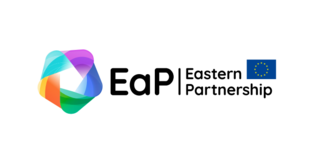
The Eastern Partnership (EaP) is a joint initiative of the European Union, together with its member states, and six Eastern European countries. The EaP framework governs the EU's relationship with the post-Soviet states of Armenia, Azerbaijan, Belarus, Georgia, Moldova, and Ukraine. The EaP is intended to provide a forum for discussions regarding trade, economic strategy, travel agreements, and other issues between the EU and its Eastern European neighbours. It also aims at building a common area of shared values of democracy, prosperity, stability, and increased cooperation. The project was initiated by Poland and a subsequent proposal was prepared in co-operation with Sweden. It was presented by the foreign ministers of Poland and Sweden at the EU's General Affairs and External Relations Council in Brussels on 26 May 2008. The Eastern Partnership was inaugurated by the EU in Prague, Czech Republic on 7 May 2009.

Emanuelis Zingeris is a Lithuanian philologist, museum director, politician, signatory of the 1990 Act of the Re-Establishment of the State of Lithuania, currently serving as a Member of the Seimas, chairman of its foreign affairs committee, Vice President of the Parliamentary Assembly of the Council of Europe and President of the Parliamentary Forum of the Community of Democracies. A Lithuanian Jew, he has been director of the Vilna Gaon Jewish State Museum, honorary chairman of Lithuania's Jewish community, and is Chairman of the International Commission for the Evaluation of the Crimes of the Nazi and Soviet Occupation Regimes in Lithuania. He is a founding signatory of the Prague Declaration on European Conscience and Communism, that proposed the establishment of the European Day of Remembrance for Victims of Stalinism and Nazism.
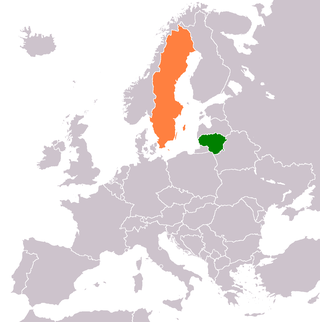
Lithuania–Sweden relations are the foreign relations between Sweden and Lithuania. Sweden has an embassy in Vilnius. Lithuania has an embassy in Stockholm.
World Without Nazism is a Russian political organization with ties to Vladimir Putin's government, which claims to campaign against "neo-fascism." The group has also been described, by security agencies from Estonia and Latvia, as a Russian propaganda organization, and as a Kremlin-sponsored GONGO, which aims to advance Russian foreign policies against formerly Soviet-occupied countries and to promote "a Soviet-era approach to World War II". The organization was founded and is led by Boris Spiegel, a Russian oligarch with close ties to Putin. It was founded in Kyiv, Ukraine, on 22 June 2010, and is registered in Strasbourg, France.

Ingrida Šimonytė is a Lithuanian politician, public servant and economist who is serving as the 17th and current prime minister of Lithuania since 2020. She has been a Member of the Seimas for the Antakalnis constituency since 2016 and was Minister of Finance in the second Kubilius cabinet from 2009 until 2012. Šimonytė was a candidate in the 2019 presidential election, but lost in the second round runoff to Gitanas Nausėda. She has been a member of Homeland Union since 2022, having previously been an independent politician.
This is a list of 2004 events that occurred in Europe.
This is a list of 2001 events that occurred in Europe.

Gitanas Nausėda is a Lithuanian politician, economist, and banker who is serving as the ninth and incumbent president of Lithuania since 2019. Born in Klaipėda, Nausėda graduated from Vilnius University with an economics degree in 1987. He was director of monetary policy at the Bank of Lithuania from 1996 to 2000 and chief economist to the chairman of SEB bankas from 2008 to 2018.

The Free Russia Forum is a conference of the Russian opposition, held twice a year in Vilnius (Lithuania). The forum was founded in March 2016 by Garry Kasparov and Ivan Tyutrin, the former executive director of the Russian democratic movement Solidarnost.














